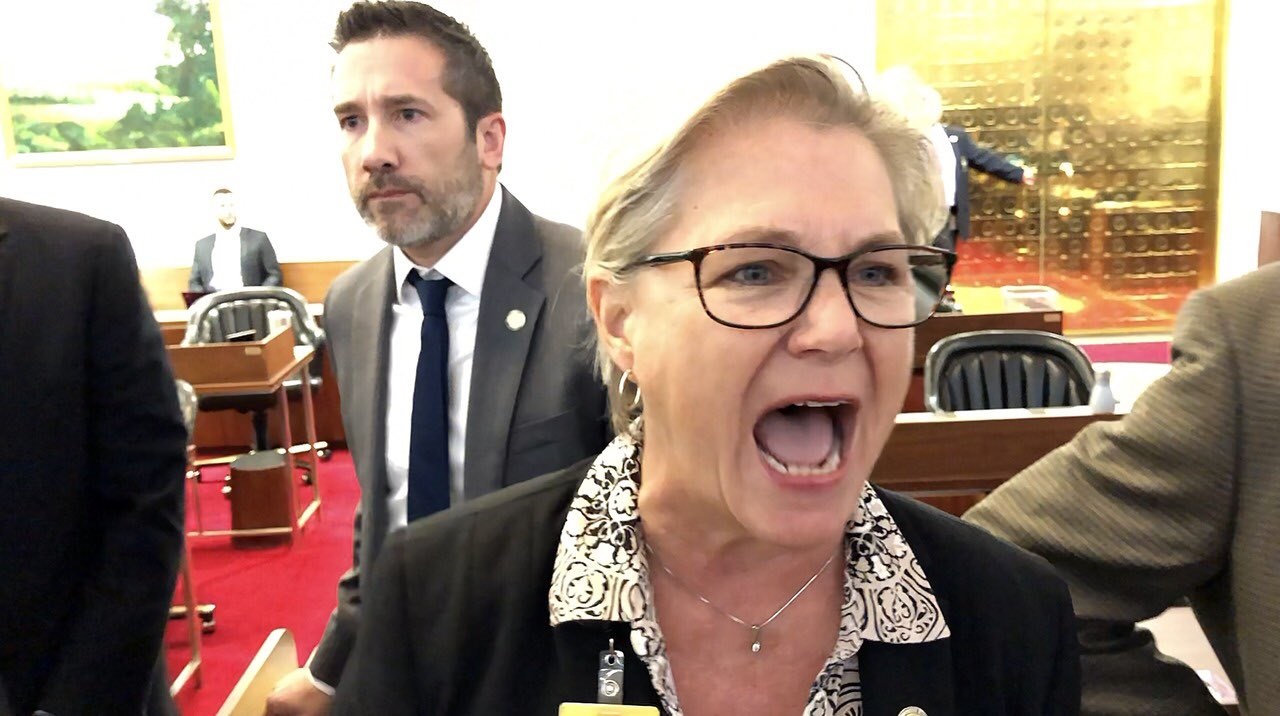Representative Deb Butler has gone viral for her fiery protest to the House majority’s surprise veto override vote during a 9/11 commemoration ceremony. (Photo courtesy of Terrance Everitt’s Twitter)
“It’s undermining people’s trust in government,” “It’s like a power-grab,” “They want to win at any cost,” “I was just in shock that this was happening,” are just some of the phrases used to describe the political stunts that the North Carolina State House GOP have been playing to get their way.
“For eight years in the North Carolina House, the majority party was able to operate without any checks and balances, and this is the first time since 2011 that [Democrats] have had some leverage of power,” said Representative Ashton Clemmons (D-Guilford) in a phone interview.
She’s referencing the 2018 midterms when Democrats flipped 10 seats in the NC State House, breaking the Republican supermajority. Without the supermajority, Republicans no longer have enough members to override Governor Cooper’s [D] vetoes.
“They had attempted to bribe our members with big projects in their districts. They had tried to cajole people into voting with them or threatened others to vote with them. We had held strong. When they couldn’t beat us head to head they created a little misdirection,” said Representative Deb Butler (D-New Hanover) in a phone interview while describing what House Democrats have had to go through in these veto stand-offs.
Since none of that worked, the House GOP have been playing attendance games with Democrats. “The way that the rules of the House work is that The Speaker can put the bill on the calendar indefinitely. It really causes members to have a lot of anxiety about missing votes and if this vote ever came up,” said Representative Julie Von Haefen (D-Wake) in a phone interview.
In short, Republican leadership in the House can schedule override votes everyday, if need be. A perk of being in the majority is that the Republicans get foresight on when votes will be so that they can plan vacations and events. This scheme has left all the House Democrats in the dark about the schedule. This has been extremely frustrating for Democrats who have had to cancel family vacations, conferences, other jobs, and even medical treatments because they were needed in Raleigh to vote.
“What people don’t realize is that this is a part time job. They don’t pay us a lot to vote,” said Representative Wesley Harris (D-Mecklenburg) in a phone interview. Many legislators are also attorneys and have law practices to run while also being a legislator. Not knowing the voting schedule makes working these other jobs extremely difficult.
These attendance games really were made public in May when Republicans were trying to override Governor Coopers veto on the Born Alive Bill, a controversial piece of abortion legilstation. Before the override votes, Representative Sydney Batch (D-Wake) had been diagnosed with breast cancer had undergone a mastectomy. Batch had planned to take time off to recover but the NC Speaker of the House Tim Moore (R-Cleveland) refused to acknowledge her ailment.
The speaker rescheduled the veto vote at least ten times trying to get a time where not enough Democrats were in attendance to sustain the veto. These actions forced Batch to continuously be present. Batch had to be driven to sessions by Representative Clemmons because she was too weak to drive and was seen to be frail on the House Floor.
Moore responded to criticism by saying that all Democrats had to do was look at the calendar and respect the rules of the House so that North Carolina babies could be protected from late term abortion. The veto of the Born Alive Bill was eventually sustained.
Democrats were finally caught off guard though. On the morning of September 11, Democrats were shocked when they heard that Republicans were going to finally vote to override Governor Cooper’s veto on the budget bill. “I was pretty shocked to say the least. It was funny because now thinking back to that morning, the whole thing lasted a lot longer than it actually did… [Moore] actually called for the vote and the vote was taken within a minute,” said von Haefen.
Normally, debate is allowed for these votes by members each getting fifteen minutes to talk. “When they called for the motion to override the veto, we all pressed our buttons to signal that we wanted to speak against the motion… and that’s when Representative Belk and Representative Butler started objecting. The speaker turned off their microphones and called them out of order, that’s when all hell broke loose,” said Harris when describing the series of events.
Democratic members of the House and members of the press were both told that there weren’t going to be any votes that morning, Speaker Moore denies those claims. Moore says that he was clear that there could be votes that morning and would always hold the vote if the opportunity came about. Fifty of the sixty-five Republicans were there, only twelve of Democratic Reps. were there. The veto was overridden 55-9.
Those aren’t the only things the NC GOP has been called out for in the last year. Recently a court ruled that about 70 of that legislative districts that they drew were drawn so partisanly that they gave Republicans an unfair advantage.
“Well if you want to get the majority or the supermajority, gerrymandered districts will help with that won’t it? It goes back to the power-grab again, because if you have the districts and you get the numbers that means you get the Representatives,” said Representative Kandie Smith (D-Pitt) in a phone interview. Smith’s district was found to be unfairly drawn after it was originally struck down as a racial gerrymandered district. It is a majority black district centered around Greenville.
“It’s a numbers game… basically what it does is it maximizes the number of wasted votes. When you look at how Mecklenburg is drawn, there are 12 house districts in Mecklenburg and there are pretty much about 4 where only Republicans live, so the other eight districts are about 75-80 percent Democratic,” said Harris while explaining how some districts “pack” voters in. Harris represents one of the 4 districts that he mentioned, a small suburban district in the southern corner of Mecklenburg county.
Every Representative interviewed for this article said they support establishing an independent redistricting commission to stop gerrymandering in North Carolina by both parties. Usually, independent commissions are made up of one third Republicans, one third Democrats, and one third Independents. They are not allowed to look at legislators’ addresses. This process is meant to create a completely unbiased drawing process and a fair map.
House Republicans are opposed to independent redistricting commissions. They point to the North Carolina constitution that gave the power of redistricting to the legislators. Rep. David Lewis (R-Harnett) struck down the idea in a PBS interview saying Independents with no political bias “don’t exist”.
The overarching theme here is that these actions performed by Republicans, malicious or not, degrade the public’s trust in government. People don’t want to turn on the news to see a state legislator screaming her warranted objection to a vote because the Speaker turned off her microphone. They don’t want to see a sickly legislator forced to show up because the Speaker wouldn’t delay a vote for her. They don’t want to look at the district they live in and see ugly lines drawn to pack and and crack voters. Republicans and Democrats need to work together, conducting themselves with integrity and transparency to make life better for all North Carolinians. That’s the only way they’ll gain back the people’s trust.

Hi! My name is Jacob Smith and I am a staff writer for The Mycenaean. I am also a political activist and volunteer.

Leave a Reply